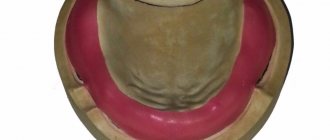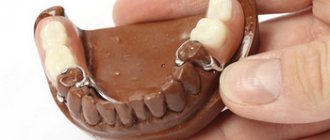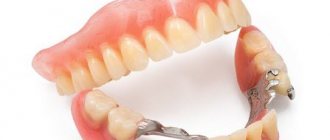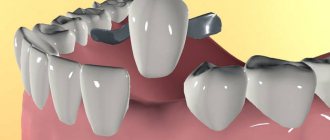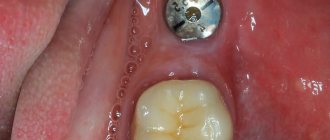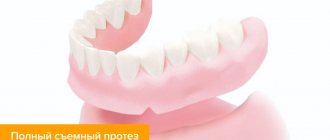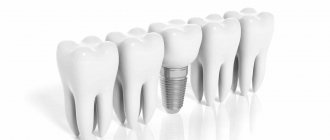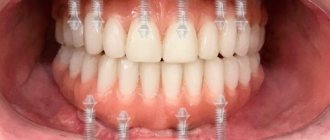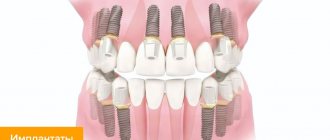If teeth are lost, restoration of natural functions is possible with removable dentures.
Partial dentures not only replace missing teeth, but also prevent the displacement of other elements of the dentition. Dentistry 32+ offers the services of experienced specialists. Despite the high level of service and professional approach to treatment, prices for dentures are affordable for everyone.
Metal-ceramic crowns
The installation of a metal-ceramic crown is performed when there is a significant violation of the integrity of the tooth, when therapeutic treatment is no longer advisable.
Metal-ceramic crowns are a particularly durable orthopedic structure on a metal base. It is distinguished by high performance, long service life, high strength and aesthetics.
A bridge for chewing teeth made of metal ceramics for the patient.
And thanks to a special manufacturing technology - the metal crown is covered with several layers of ceramics, the denture does not stand out from the natural dentition.
Consultation at our clinic is completely FREE. You can make an appointment by calling +7
Removable prosthetics in our clinic
Our specialists install any types of prostheses, which are divided into clasp, plastic, acrylic and nylon. We produce dentures based on individual patient impressions, which allows you to avoid any discomfort and quickly get used to your new teeth. The material is selected based on medical indications and characteristics of the patient, to calculate which we conduct an examination. All prices are listed below, you can also read reviews of removable dental prosthetics.
When choosing a dental clinic where you want to have a dental crown prosthetic performed on an implant that you have already installed, you should pay attention to both the qualifications of the staff and the quality of the materials used in the manufacture of the crown. Our dental clinic has both of these parameters, which means the result and your satisfaction with our work are guaranteed.
Prosthetics on implants in our clinic
We provide prosthetic services on implants only from high-quality materials. Our crowns are manufactured using the technology of metal-free ceramic crowns and metal-ceramic crowns, which are then securely installed on the abutment of your implant. In the production of ceramic crowns for implants, we use the most modern CAD/CAM modeling technology, which allows us to produce the crown as accurately as possible for your comfort. We also use high-quality ceramics, including metal-ceramic crowns with a durable metal frame.
How to choose a crown
We advise you to decide on the type of crown based on what type of your “native” tooth is replaced with an implant. A metal-ceramic crown is better suited for installation on chewing teeth, as it has high strength. For installation in the smile area, it is better to install a metal-free ceramic crown due to its slightly better appearance. Whatever crown you choose as a prosthesis on your implant, if you follow the recommendations, it will serve you for a long time, which is about 15 years. For your convenience, all prices are listed below.
Metal ceramics in dentistry
The method of replacing one or more units of the dentition is called prosthetics. There are many materials from which a prosthesis can be made, they differ in cost, strength, and aesthetics.
One of the most versatile and popular materials for prosthetics, as already mentioned, is metal-ceramics .
This is due to the fact that the material is similar in structure and physical properties to natural enamel. In the dental dictionary, metal-ceramics means the manufacture of crowns and bridges , the frame of which is made of metal and the surface is coated with ceramics. The use of alloys made of expensive metals allows the highest quality of the frame to be achieved. The shape of the frame is exactly similar to the tooth being replaced.
The technician covers the surface of the frame with ceramic cladding. The advantage of the material in this case is the ability to select the shade of the coating to match the enamel of the remaining teeth. The finished prosthesis is hypoallergenic and compatible with oral tissues. Sometimes, in rare cases, allergies can trigger a reaction to the material. Then the metal-ceramic crown is replaced with a completely ceramic one without metal inserts, for example, all-ceramic E-max crowns. Which completely eliminate the possibility of allergic reactions.
The scope of application of metal ceramics is the manufacture of dentures for chewing teeth , due to the strength of the final structure, but it is also used for the anterior groups of teeth.
What is the service life of a metal-ceramic crown?
The quality of a metal-ceramic crown is largely determined by the properties of the alloy from which the prosthesis frame is made; it is this that is responsible for the strength of the structure as a whole. The alloys from which crowns are made in our clinic have a service life of at least 12-15 years .
Prosthetics of anterior teeth
Prosthetics of the front teeth with metal-ceramic crowns is possible, but there is a high probability of the metal crown being visible through a thin layer of ceramic in the visible zone, which significantly affects the overall aesthetic appearance of a row of teeth. It is used according to the patient’s decision, or when it is impossible to restore the integrity of the tooth using filling materials and onlays. For prosthetics of the smile area, all-ceramic crowns or ceramic crowns on zirconium dioxide are more suitable.
At the client’s request, to install metal-ceramic crowns on the front teeth; with proper care, the service life of the dentures is at least 10 years.
Strength
Metal-ceramic crowns and bridges are highly durable, which is why they are most often installed in the chewing area of the dentition. Recently, crowns on a frame made of zirconium dioxide and aluminum dioxide have gained great popularity. They are installed not only on the chewing teeth, but also on the front teeth.
Allergic reactions
Ceramic coating on the surface of the crown is absolutely hypoallergenic and is well tolerated by the body. The metal alloy from which the frame of the denture is made may contain metal, which in rare cases causes an allergic reaction.
It is necessary to pay attention to allergy symptoms in time:
- burning in the mouth,
- swelling of the gums near the crown;
- metallic taste.
If after installing the structure the following signs are noticed, you need to contact your dentist and replace the denture with an all-ceramic one.
Zirconium dioxide (ceramics based on zirconium dioxide)
The zirconia crown base has a color that imitates the color of the tooth and has high light transmittance. The zirconium dioxide frame is lined with ceramics, and the tooth on which such a crown is installed looks natural and aesthetically pleasing.
pros
- The highest aesthetic indicators;
- biocompatibility;
- do not cause allergic reactions.
Minuses
- High price.
Metal ceramics or ceramics?
The determining factor when choosing a material for a prosthesis is its direct function: strength or aesthetics. To replace a chewing tooth, a more durable material is required, but its aesthetic qualities fade into the background, since it is located behind the smile area. In this case, a metal-ceramic crown . When making anterior dentures, aesthetics are important; the beauty of the smile will depend on the crown, so all-ceramic dentures are preferable.
Aesthetics
When installing metal-ceramic prostheses, the compliance of the design with aesthetic indicators is of great importance:
- Correctly chosen color;
- The shape of artificial teeth corresponds to the anatomical shape of natural teeth;
- The organic combination of a denture with natural teeth is achieved by choosing the right shade of dye for the incisal edge, interdental spaces and cervical area.
Metal ceramics look very aesthetically pleasing and do not differ from natural teeth.
Types of metal-ceramic structures
Metal-ceramics is a multifunctional material from which the majority of orthopedic structures can be made, which will help solve many dental problems. These include:
- Bridges and crowns - applicable when it is necessary to restore from two to four units of the dentition in the front or side;
- Restoration of damaged parts of teeth as a result of external damage;
- Abrasion of tooth enamel;
- Supports for temporary dentures;
- Correction of other aesthetic defects.
Advantages of metal-ceramic prosthetics
The most important advantage of metal-ceramic crowns is their long service life ; they do not wear down while chewing food. If you regularly visit your dentist and are attentive to oral hygiene, your denture will last at least 15 years.
To make metal-ceramic crowns, it is possible to use a large number of metals and their alloys of different prices, which makes prosthetics more affordable.
If the ceramic coating on the prosthesis is done with high quality, the patient can be sure that the metal-ceramic crown will not stand out from the row of “natural” teeth.
With properly performed prosthetics, the process of chewing food does not cause any unusual sensations, the difference between natural teeth and dentures is not noticeable.
There is no accumulation of bacteria on metal-ceramic teeth; this is especially important for patients with periodontal disease.
With the help of metal-ceramic dentures, it is possible to restore damaged teeth even in severe advanced cases. The metal-ceramic crown is so durable that the appearance of cracks and chips is practically excluded. After installation of the prosthesis, the patient can chew hard vegetables and fruits without fear. Keeping the crown in its original form does not require much effort. To do this, simply brush your teeth twice a day and visit a dental hygienist every six months.
Disadvantages of metal-ceramic crowns
Despite the advantages, there are a certain number of disadvantages of metal-ceramic prosthetics:
- The need to depulp the tooth, which leads to some fragility in the future;
- Due to the large thickness of the structure, the hard part of the tooth is subjected to significant excision and grinding;
- It is impossible to install metal-ceramic crowns in the absence of a large number of teeth.
Types of bridges
Types of bridges include artificial teeth of varying cost and materials. The most popular are metal-ceramic and ceramic bridges. Both types are characterized by strength. Such crowns are reliable, biocompatible, do not cause allergies and do not cause harm to health. The service life of these dentures is more than 5 years, which allows patients to completely forget that some teeth have been replaced with artificial ones.
In the case of installing metal-ceramics, a metal base made of gold, chromium, cobalt, platinum or a combined alloy is installed first. The metal is then coated with a layer of ceramic that exactly replicates the shade and quality of real tooth enamel.
Ceramic dental prosthetics is possible when there is a small, up to 2/3 of the total size, fragment of a destroyed tooth. The ceramic structure, specially created in the laboratory, is indistinguishable from a real tooth and is made in accordance with the individual characteristics of the patient, even replicating the natural transparency of the enamel.
Stages of dental prosthetics
The total duration of the procedure for restoring teeth using metal-ceramic prosthetics is approximately 1-2 weeks, in some complex cases it may take a little longer due to the individual characteristics of the patient’s treatment plan. The preliminary part is the therapeutic part, during which it is necessary to heal all teeth with caries, gum disease, and perform root canal filling. After this, you can begin installing the prostheses. The process includes the following steps:
- Consultation and development of a treatment plan for the patient.
- Tooth preparation for metal ceramics. Using painkillers, the tooth is ground down. A metal-ceramic crown can be installed on a living tooth, but there is a need to depulp it. Choosing a method of fixing a crown on a pin or inlay, in the absence of most of the tooth.
- Taking impressions of the lower and upper jaws.
- Making a prosthesis by a dental technician using individual impressions. It includes two stages: manufacturing a metal frame and applying layers of ceramics to it.
- Trying on a prosthesis.
- Fixation of the prosthesis to the patient.
Features of removable dentures
Orthopedic structures are used to restore aesthetic indicators and chewing functions.
Removable dentures rest not only on the teeth, but also on the gums, which are adapted to chewing loads.
That is why after installation there is discomfort throughout the entire period of adaptation (1-2 months).
The clinic in Krasnoyarsk produces dental prostheses that have high aesthetic and strength characteristics. They are not only functional, but also comfortable. The patient receives the finished prosthesis in just 2-4 visits.
Care of metal-ceramic structures
To ensure that the structure does not fail before the end of its operational life, it is necessary to comply with some requirements:
- no smoking;
- brush your teeth twice a day;
- do not eat too hot or cold food - this can cause cracking;
- regular preventive visits to the dentist.
Contraindications to the installation of metal-ceramic structures
Installation of metal ceramics is strictly contraindicated if:
- Bruxism;
- Mental disorders;
- Periodontitis.
- With caution during pregnancy, abnormal bite.
Patient review of metal-ceramic crowns
Types of removable dentures
Dentures are made from high-quality consumables (made in Germany). They are hypoallergenic and safe, so there are no contraindications for installation. The cost of dentures depends on the material used.
In dentistry, removable prosthetics are:
- Acrylic (reinforced plastic base) Used for patients of various age groups and is inexpensive. Acrylic dentures are in demand among older people who are completely missing teeth.
- Nylon (flexible dental nylon with fixing arms) The design is flexible, so deformation and breakage are excluded. Throughout the entire period of use, the original color and shape are maintained. The disadvantage is the lack of relocation capabilities.
- Clasp (metal frame and thin layer of plastic) is characterized by quick adaptation, preservation of intelligible pronunciation and absence of discomfort during meals. The structures are made with clasps and locks.
Undoubtedly, clasp removable structures are in greatest demand. In this case, the manufacture of dentures is possible with various fastening methods.
When using locks (attachments), we are talking about a fixed, rigid fixation. In this case, the pressure during chewing falls mainly on the supporting teeth. Unlike clasps, this fixation option is hidden inside metal crowns placed on the supporting teeth. Thanks to its high-quality design, the prosthesis is invisible to others when you smile.
Cost of installing metal ceramics
The cost of installing a metal-ceramic prosthesis by several factors, the main ones being preparation of the tooth for prosthetics and whether the tooth needs to be depulped. How will the crown be fixed to the tooth using a pin or inlay? The fundamental factor is the complexity of each individual clinical case. The cost of a metal-ceramic crown in our clinic is 7,000 rubles. for one unit .
It is possible to determine the final cost and draw up an individual treatment and prosthetic plan during a personal consultation with an orthopedic dentist.
sign up for a free consultation by calling +7

